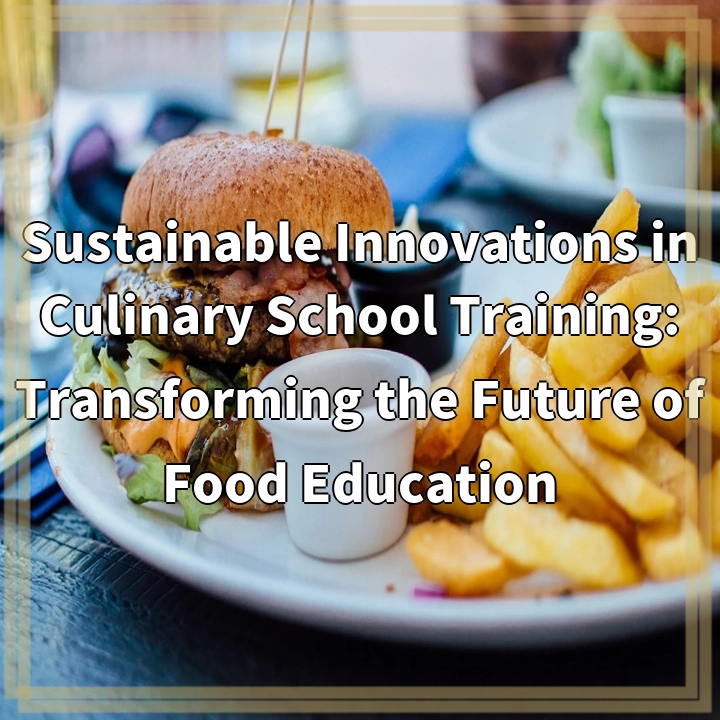
What it is:
Sustainable innovations in culinary school training focus on integrating environmentally responsible practices into culinary education. This approach not only enhances the culinary skills of students but also fosters a deep understanding of sustainability principles. Culinary schools are increasingly adopting sustainable practices such as farm-to-table sourcing, reducing food waste, and utilizing seasonal and local ingredients. By emphasizing these sustainable innovations, culinary students are better equipped to meet the demands of a changing food landscape and contribute positively to the environment.
The Rise of Sustainable Culinary Education
As the global food system faces significant challenges, culinary schools are responding by redesigning their curricula to include sustainability as a core component. Programs are prioritizing education around food systems, ecological impacts, and community engagement. Students learn how to prepare meals in energy-efficient kitchens and discover the importance of ethical sourcing practices. This innovative training helps promote an awareness of the broader impacts of food production and consumption.
Real-world problems
Despite the growing emphasis on sustainability in culinary training, several real-world problems persist that hinder progress. One major challenge is the lack of standardized curricula addressing sustainability across culinary schools. While some institutions lead the way with comprehensive programs, others may lag behind, resulting in inconsistencies in educating future chefs about sustainable practices.
Resource Limitations
Many culinary schools, particularly those with limited budgets, face difficulties in implementing sustainability initiatives. Access to local, organic produce can be cost-prohibitive, and the necessary infrastructure for composting and waste reduction may not be in place. Resource constraints can limit the scope of sustainable practices that can be effectively taught and implemented in the kitchen.
Industry Resistance
An additional barrier to the implementation of sustainable innovations is the resistance from the food industry itself. Established restaurants and food service providers may be hesitant to change their operational practices, prioritizing cost over sustainability. This resistance can impact how culinary students perceive the applicability of their sustainable training once they enter the job market.
Challenges in Consumer Awareness
Consumer awareness and education also play a critical role. Many consumers are still unaware of the importance of sustainable practices in the culinary world. Culinary students must be trained not only in sustainable practices but also in how to communicate these benefits to the public. Without a strong awareness among consumers, sustainable innovations may struggle to gain traction in the broader market.
Conclusion
Addressing these real-world problems requires a concerted effort from culinary educators, industry professionals, and consumers alike. By fostering collaboration and sharing best practices, the culinary landscape can become more sustainable, paving the way for future chefs to lead the charge in creating a healthier and more responsible food system.

Solutions to Sustainable Innovations in Culinary School Training
To effectively address the challenges surrounding sustainable innovations in culinary school training, several solutions can be implemented. These solutions involve enhancing educational frameworks, industry collaboration, and consumer engagement, ultimately paving the way for a more sustainable culinary future.
Standardizing Sustainable Curricula
A key solution is to develop and standardize sustainability curricula across culinary schools. Establishing clear guidelines and best practices will help ensure that all students receive a comprehensive education in sustainable culinary practices. Collaboration between educational institutions and industry organizations can facilitate the sharing of resources and knowledge, making sustainability a core element of culinary training.
Providing Resources and Support
Culinary schools need increased access to funding and resources to implement sustainable practices effectively. Financial support from government programs, non-profits, and industry partnerships can help institutions upgrade their facilities and provide students with the tools needed to practice sustainability in the kitchen. This could include investments in energy-efficient equipment, waste management systems, and access to local suppliers.
Industry Partnerships
Fostering partnerships between culinary schools and the food industry is crucial. By collaborating with restaurants and food service providers, schools can create internships and apprenticeship programs that emphasize sustainable practices in real-world settings. These partnerships will not only enhance student learning but also encourage industry stakeholders to adopt more sustainable operations.
Enhancing Consumer Awareness
Engaging with the community and raising consumer awareness about sustainability in the culinary field is essential. Culinary schools can host workshops, public events, and cooking classes that showcase the benefits of sustainable food practices. By educating consumers, culinary students can better equip themselves with the skills to advocate for sustainability in their future careers.
Continuous Improvement and Adaptability
Finally, ongoing evaluation and adaptability in teaching methods are vital for addressing the evolving landscape of sustainable culinary education. By staying informed about the latest trends and innovations, culinary schools can continuously improve their programs and better prepare students for the challenges and opportunities that lie ahead in the food industry.















